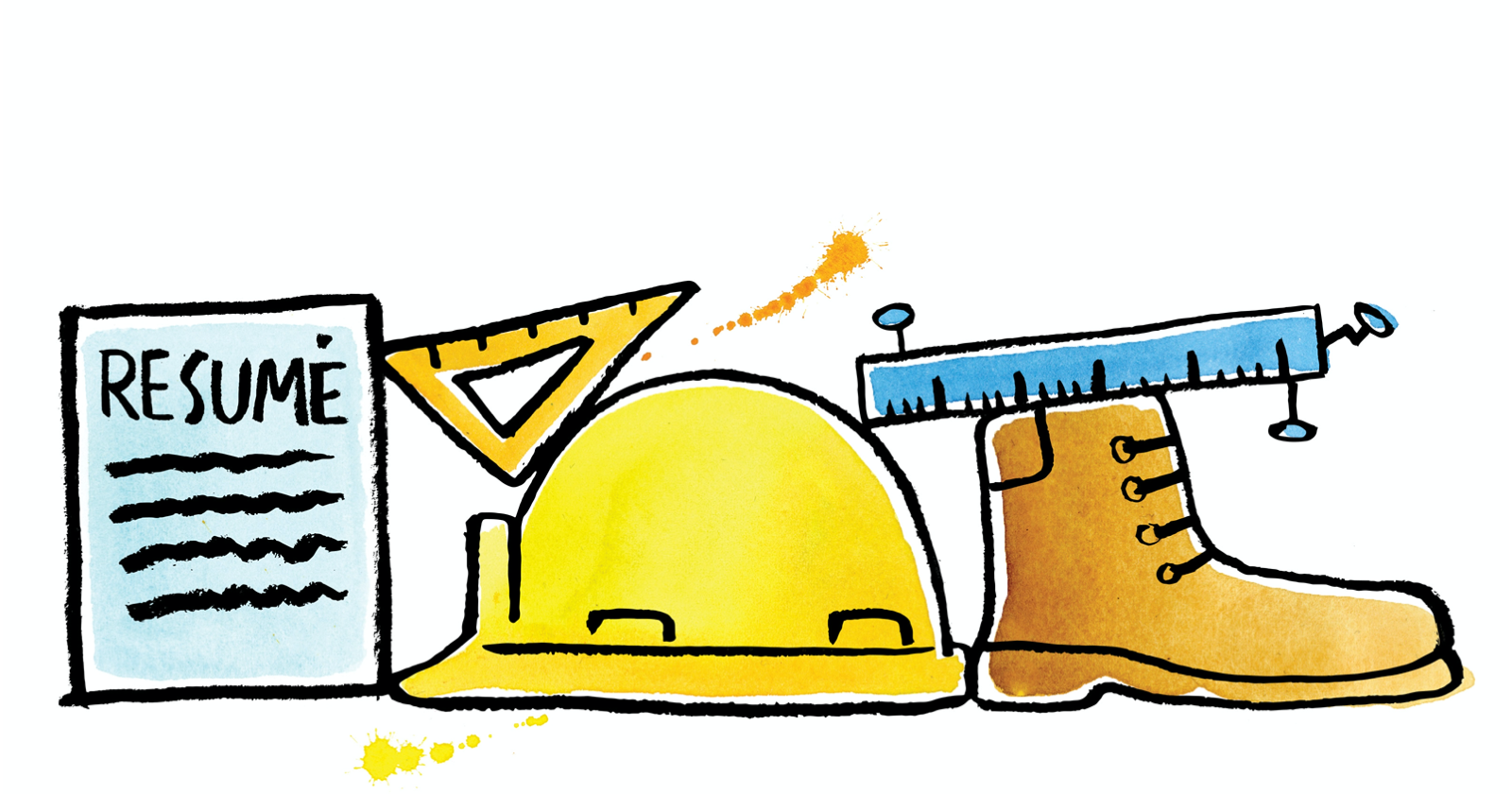
The thing about hiring is we all think we have a process.
But how is that "process" actually performing for you?
According to a 2018 report from the US Bureau of Labor Statistics, construction is predicted to be one of the fastest growing job sectors through 2026, adding about 747,600 new jobs.
Problem is, there aren't enough skilled workers around to do the work.
It's time for a different approach to construction hiring.
Consider this your step-by-step playbook for building a pipeline of awesome construction candidates so that you always have the talent you need to keep your projects moving.
Step 1: Lay your hiring foundations
Any construction worker worth their weight knows a strong foundation is everything.
That means getting the lay of the land and making sure you have the right materials for an efficient recruitment process.
From understanding the bigger picture for your business to perfecting your job ads to the 't', if you really want to hire the best construction workers you need an airtight plan.
Know your big picture
Before you can create your set of stellar hiring practices, you need to be 110% confident you're hiring for the right roles and reasons.
That means getting your goals and values straight, today.
Ask yourself:
- What’s the ultimate big picture strategy for your construction business?
- What principles guide you?
- How does your hiring plan align with those goals?
Tell job seekers what's in it for them
Today's construction workers have plenty of options.
As Tyson Conrad, CEO of Tampa-based Goliath Construction Consulting, puts it, "For so long, it was seen that if you worked with a hard hat, you didn't make a lot of money and you were a dummy. I can tell you that is contrary to everything that is reality."
Show job seekers you get it by helping them visualize the impact they can make by working with you, not to mention the great perks that take your offer above and beyond the competition's.
For example, leadership at Prescient Construction rally their team around their core mission of "attainable housing"—and they're using new technology to show their candidates they walk the walk.
The North Carolina startup is reinventing and automating every step of the construction process to complete projects faster and keep their teams laser-focused on the bigger mission behind every project to help them stay on top.
“Over the past six years, we’ve been quietly developing our technology, our 75-patent portfolio across 30 countries [...]. And we’ve only just begun. But we’re not resting on our laurels because the worst thing you can do is become complacent; that’s when the rest of the pack will catch up. We’re staying one step ahead by constantly innovating,” says Satyen Patel, Executive Chairman.
Optimize your job descriptions and ads
A great job description will double as an avatar for your ideal team member. So don't rush it.
Talk to your team leads and field supervisors to pinpoint who they need, why they need them and the exact results they expect to see from filling this role.
Here’s how to paint a clear picture of your ideal candidate:
- Replace 'responsibilities' with impact: Offer applicants a crystal-clear understanding of the position’s purpose by starting your job description with an ‘Impact’ section. This should outline the value of their skills and explain how they can drive real-world success for your company—in five lines or less.
- Skills and qualifications are great, but they’re not everything: We all know there’s a war for talent out there in the construction industry. So now is not the time to get unnecessarily picky about qualifications. Think of ways to grow talent by investing in training opportunities, apprenticeships and partnering with local schools.
- Clarify compensation: It can be tempting to leave pay out of job descriptions. But if you've done your homework, there's no reason to hide what you're offering. Applicants admire transparency—especially millennials.
Use inclusive language to widen your talent pool
The construction industry is still a lot like it was when it first started: male-dominated.
And career stereotyping is holding women back from joining the field. As the labor market shrinks, you need to do everything you can to expand your talent pool to include every qualified candidate, male or female (more on this later).
Not only that, companies with inclusive talent practices have 30% higher revenue per employee than companies that don't. 😮
Lucky for you, there are simple ways to overcome the unconscious stuff that gets in the way of a great hire:
- Delete jargon and replace it with clear, accessible terms. Why not have tradespeople on your team?
- Aim for a balance of masculine and feminine-themed words.
- Unless characteristics like gender, sexual orientation, religion, racial group or ability are directly relevant to the role, leave them out.
- 67% of job seekers say they care about your diversity statistics, so it’s time to update your EEO and Fair Hiring Statements too.
Step 2: Position your employer brand to win top talent
It's a tight talent market out there, and candidates have very little time for BS.
That’s why it’s time to make sure your employer brand actually jives with what you're saying to potential candidates.
And given the harsh work conditions and long hours, work-life balance is making its way to the top of the must-have list for the next gen of construction workers.
Make sure to offer the classic benefits workers have come to expect and the more modern perks that draw more appeal with younger job seekers:
- Health and safety are still at the top of the list in this industry. Make sure you stick with a great health plan and a fully-certified safe working environment.
- Family benefits are crucial to attracting and retaining top talent. Offer parental leave and consider allowing employees to work reduced or flexible hours.
- 59% of millennials say the opportunity to learn and grow is extremely important to them when applying for a job. Offer learning and development opportunities by way of on-the-job mentorship and apprenticeship, and ongoing skills training programs.
- When it comes to financial benefits, remember construction is a cyclical business with ups and downs along the way. Take care of the people who contribute to your company’s success by having an employer-matched 401(k) plan for employees.
Check out what the Evil HR Lady has to say about why it’s SO important to be clear about what you offer:
Step 3: Create a killer career page
A great career page will inspire visitors to become applicants, while helping them self-select whether or not they're the right fit.
Here's what you need to make that happen:
- Craft a compelling mission statement: Strike out the jargon and state straight up why working for your company is both fun and worth it. (And please don’t call it a “mission statement!”)
- Showcase your culture: Show off your inclusive work culture by sharing pictures or videos of your team. If you can highlight your participation in internal or community events that support women and other marginalized groups, even better.
- Social proof: 92% of consumers trust peers over brands. Add employee testimonials to your career page to help build trust with passive candidates. You can even integrate your latest Glassdoor rating.
- Clear values: State your values loud and clear where every potential candidate can see them.
- Live chat: Answer candidate’s questions immediately using a chatbot messenger tool. You can opt to have your convos human or AI-led, then add that info to your applicant tracking system (ATS) to keep all future conversations as relevant as possible.
Need more inspiration? Here are five awesome career page examples to get you started.
Step 4: Source Like a Pro Recruiter
Once you have a killer job ad, the only question is where to put it?
Today, recruiters do the same legwork to place a temporary worker as they do for a permanent position. But filling any type of role takes time and money.
So you need to know which avenues will get you the biggest bang for your buck.
Optimize your referral network
Word of mouth is big.
Reach out to your network, including your current employees, with a quick email letting them know what types of workers you're constantly on the lookout for and get ready to do some serious hand-shaking.
If your ATS has a browser extension (Psst! We can think of one that does), use it to automatically pull candidate info straight from LinkedIn into your hiring pipeline. You might also want to set up automated reminders to follow up with the contacts in your network by email or phone.
The job boards: where and how to post
There's a job board out there for virtually every type of candidate, but each one comes with a cost. Before you invest in paid job boards (which can range anywhere from $25-$5,000 and up), it's always a good idea to post your ad on free, high-traffic sites.
If possible, save yourself a ton of time and use your ATS to automatically broadcast your ad across all the free job sites. Here are a few of the top job boards you might want to try:
Free job boards
Premium job boards
Construction job boards
Source from a broad range of applicants
A 2017 AGC survey reports that 79% of construction firms are actively recruiting veterans, 70% are actively recruiting women and 64% are actively recruiting African Americans.
Now that you've got a beautifully balanced job ad and awesomely inclusive careers page to back it up, why not expand your reach to include more workers from underrepresented groups?
If you're not sure where to start, check out this list of the top job boards for diversity hiring.
Always follow up
Have you ever been marketed to just once?
Didn’t think so.
Salespeople and talent sourcers alike know it takes four to eight touches to see progress, with conversion rates steadily increasing as the amount of touches go up. Calling it quits after the first email is a waste of the time and effort you put into finding great candidates in the first place!
Space your emails a few days apart (or up to a week, depending on seniority), and keep ’em short, like:
- “Bringing this back to the top of your inbox!”
- “Did you get a chance to check out [company/role] yet?”
- “Hey—have to give you another ping on this, it’s too perfect to miss…”
With the right tool, it can be a lot less work than you think. Set up your pipeline to keep the hottest candidates highest on your radar and set an automated nurture sequence for applicants or candidates that weren't a fit this time but could be awesome in the future.
Remove your recruitment bottlenecks
If you're already working within an ad hoc hiring process, take a minute to identify the bottlenecks.
Companies like GE have reduced hiring time by 70% with an agile approach to crushing recruitment bottlenecks.
In GE's case, interview scheduling was the time suck. (Don't we all know the pain of group email chains. 🙄) But by implementing an automated interview-scheduling tool they scaled back the time to hire from 15 weeks to less than 3-6 weeks.
Step 5: Get women on board
Historically, women have been almost completely left out of the construction workforce—leaving us with a major shortage of skilled laborers.
Today, women account for less than 3% of construction jobs despite the fact that they have important skills that could greatly benefit the industry.
In fact, research shows that gender-diverse companies are 15% more likely to outperform their competitors. And in today's tight labor market, opening the doors to more women could be the ace in your sleeve.
Here’s how you do it:
Start with culture
In an interview for Constructor Magazine, Brynn Huneke, Director of Diversity and Inclusion at Associated General Contractors of America highlights, “The most important thing a company can do to recruit and retain women is build and promote an inclusive workplace culture.”
Here are a couple of pointers to get you started:
- Ask yourself how inclusive your company is, which teams or departments are starved for female talent, and whether your policies reflect a safe, welcoming environment.
- Aim to rid your recruitment process of bias by getting more than one person’s eyes on shortlisting candidates.
Cultural change is hard and the temptation to bury your head in the sand can feel very real. But companies with inclusive talent practices are known to generate up to 30% higher revenue per employee. Commit to change and you may be surprised by how much it pays off.
Be an early adopter
In a historic industry development, female members of the Iron Workers Union now receive six months of paid maternity leave.
"We are very proud to be the first to introduce a paid maternity program in the building trades. It's about time we make our industry a level playing field for women and make diversity and inclusion a priority," said Eric Dean, Iron Workers Union General President.
The fact is, change is coming with or without you. So why not get on board?
Here are a few ways to make your perks more inclusive:
- Promote flex or remote working opportunities
- Provide plenty of options for paid leave
- Extend the length of your maternity leave
- Offer childcare, childcare subsidies or flexible spending accounts
Close the gap for good
Your commitment to the future of women in construction will show up in one crucial area: training and education.
Companies who work closely with local trade schools and universities to design women-focused apprentice programs will be the ones who succeed in attracting a steady stream of tradeswomen—and collecting all the business-boosting rewards that come along with it.
Here are some ideas to consider:
- Partner with a local school or university to encourage student awareness.
- Create in-house mentorship and apprenticeship programs for female employees.
- Sponsor a local event for girls and women.
- Lobby Congress to support skilled trades training.
Step 6: Attract and retain millennial construction workers
You've heard it before.
Baby Boomers are on the way out and millennials are taking over the workforce.
But many millennial workers aren't experienced enough to operate equipment safely or work in specialized areas. And others simply aren't attracted to the industry.
Truth is, the old tricks just won't cut it. A 2015 Glassdoor survey revealed 89% of millennials prefer benefits and perks to a pay raise and another 83% of millennials would shift their job for better benefits.
Clearly, millennials are a different breed. Here's how to get more of them on your team.
- Know who you’re dealing with: Research shows more than 50% of millennial populations in 10 different states are members of a minority group. Maybe that’s why they care so much about where brands stand on important social issues.
- Offer opportunities for growth: Forward-thinking companies like Gilbane Building Company offer in-house training opportunities to empower employees and attract younger candidates.
- Pave the way with internships: Internships are one of the most powerful ways to grow your company from the ground up. They offer the flexibility and training opps millennials prize so highly.
- Modernize your perks and benefits: Think about where you can afford to loosen the reigns and build more flexibility into your project plans and work perks. For example, learning and development, health benefits or a tech-enabled work environment.
- Add a little ✨sparkle✨: Show candidates they’re more than just a number by personalizing emails and getting to know them properly. You can do this quickly by using the right ATS, so you don't need to spend hours writing personal notes to every candidate in your backlog.
Ask yourself:
- Does your mission statement actually mean something? (Or is it just for decoration?)
- Do your values reflect your real-life working practices and expectations?
- Do your hiring practices reflect those values?
Rachel Hammerton, Director of Recruitment at Spark Lifecare explains why this works:
A better process today, a better pipeline tomorrow
If you're ready to speed past the competition and start making a proactive play for the best of the best construction talent, start by embracing the role of construction companies as developers of people—not just projects.
Sure, it's a challenge to shift gears, but commit to evolve your system along with your business and you'll always have the people you need to make great things happen. Make the right changes to your hiring process today and you'll be far ahead of the pack tomorrow.





